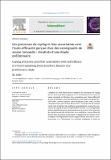Les processus de coping et leur association avec l’auto-efficacité perçue chez des enseignants de suisse romande : résultats d’une étude préliminaire
Coping processes and their association with self-efficacy in French-speaking Swiss teachers: Results of a preliminary study

Auteur, co-auteurs
Type de référence
Date
2019-03Langue de la référence
FrançaisEntité(s) de recherche
Résumé
L’objectif de cette étude était d’explorer les processus de coping mis en œuvre par 86 enseignants (19 % d’hommes) d’un canton de suisse romande, et d’évaluer leur association avec l’auto-efficacité perçue à enseigner. Deux questionnaires, the Ways of Coping Checklist (WCC) et the Teachers’ Sense of Efficacy Scale (TSES), ont été complétés entre juin 2016 et février 2017. La recherche de soutien social et la résolution de problème apparaissaient comme les processus de coping les plus fréquemment utilisés. Les enseignantes étaient significativement plus nombreuses à recourir à la recherche de soutien social afin de faire face à un problème. L’auto-efficacité perçue dans la gestion de la classe, l’engagement des élèves et les stratégies d’enseignement étaient négativement associées à l’auto-accusation et à l’évitement. Les résultats soulignent la mise en œuvre de processus de coping pertinents pour faire face aux défis actuels de la profession enseignante, et le caractère protecteur de l’auto-efficacité perçue.
Résumé traduit en anglais
Within the Swiss context of the present study, important on-going school reforms lead to new challenges and constraints for teachers. Thus, it is legitimate to question how teachers can deal with the difficulties inherent to their profession. The aim of the study was to explore the coping responses of 86 teachers (women = 70; men = 16; mean age = 38.9 ± 12.0), and to assess the possible relationships between those responses and teaching self-efficacy. Self-report questionnaires were administered between June 2016 and February 2017, with a return rate of 37.5%. Participants completed two questionnaires: the Ways of Coping Checklist (WCC) assessing five coping responses (solving problem, social support approbation, avoidance, positive reevaluation and self-blamed), and the Teachers’ Sense of Efficacy Scale (TSES) measuring three dimensions of teachers’ self-efficacy (for classroom management, instructional strategies and student engagement). The most frequent coping responses were social support approbation and solving problem. Positive reevaluation seemed to be used as an intermediate coping response for both women and men. Women were more likely to seek social support than men in order to deal with difficulties, whereas men did not report the use of specific process. Participants reported high levels of teaching self-efficacy, without significant difference between women and men. Moreover, teachers with high level of self-efficacy for classroom management and instructional strategies were less likely to use self-blamed and avoidance coping responses. Teachers with high level of self-efficacy for student engagement were also less likely to use self-blamed coping responses. Partial correlations with sex, age and years of experience as control variables were performed, and no variation was found. The findings of the present study demonstrate that social support approbation and solving problem are coping responses commonly used in our sample of teachers. The high levels of teaching self-efficacy and the lack of significant correlation between this variable, social support approbation and solving problem coping responses question us about the protective role of self-efficacy. It could be considered as a coping response, helping to appropriately overcome the difficulties linked to the teaching profession. Due to the important school reforms in Switzerland, pre-service teachers need resources and tools to deal with these new challenges. Further studies are necessary in order to better understand relationships between coping responses and teaching self-efficacy, and their potential protective or damaging effects.Titre du périodique
Psychologie françaiseMaison d’édition
ElsevierPays d'édition
Francep-ISSN
0033-2984Evaluation par les pairs (peer reviewing)
ouiPortée nationale / internationale
internationaleVolume / tome
64Fascicule
1Pagination
19-31Public(s) cible(s)
Chercheursprofessionels du domaine
Etudiants
URL permanente ORFEE
http://hdl.handle.net/20.500.12162/2693Autre(s) URL(s) permanente(s)
http://doi.org/10.1016/j.psfr.2018.03.001Document(s) associé(s) à la référence
Texte intégral :
Fichier
Accès
Commentaire
Version
Taille
- Tout ORFEE
- Détail référence



